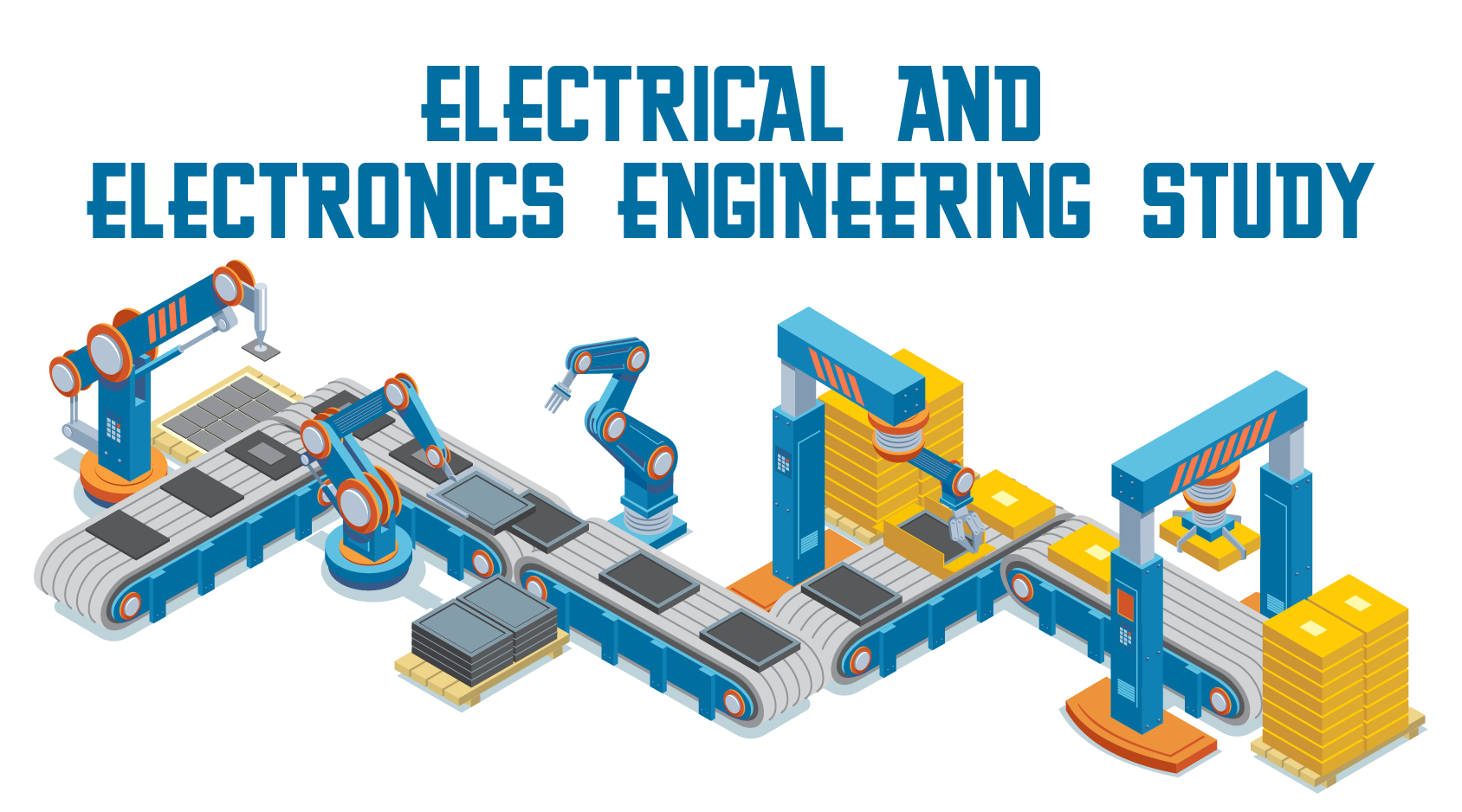Recently, the scopes for electrical and electronics engineering has amplified after the Vision 2022 for Indian Electrical Equipment Industry initiative has been declared by the Government of India. The estimated growth in this industry is expected to be 100 billion USD. This will generate around 1.5 million jobs as direct recruitments and 2 million indirect recruitments.

Electrical and Electronics Engineering (EEE) is concerned with the technologies required for our future needs that include communication, entertainment, energy, and healthcare. This course basically focuses on Power, Embedded, Analogue, Digital and Communication Systems.
What you will focus on?
- Designing and tEsting different types of electrical circuits and their components
- Researching and development of new techniques and products
- Understanding the nature of power both on a small scale and large scale
- Studying a variety of electronic courses such as micro, nano, RF, VLSI, etc.
- Study of signal & image processing, multimedia communications, electrical energy, multimodal data processing, biomedical instruments, space applications & technologies, etc.
Highlights:
| Course Name | Electrical and Electronics Engineering |
|---|---|
| Course Level | Diploma, B. Tech (Bachelor of Technology), and M.Tech (Master of Technology) |
| Duration |
Diploma: 2 -3 years B.Tech: 4 years M.Tech: 2 years |
| Examination Type | Semester Type |
| Eligibility |
Diploma: Must have completed 10th with a minimum of 50% mark in aggregate B.Tech: Must have completed 10+2 with a minimum of 50% mark in aggregate M.Tech: B.Tech or Equivalent degree in Engineering |
| Top Recruiters | Electronics and Communication department, IT industry, Telecommunication industry, Equipment manufacturing companies, Universities & colleges, etc. |
| Top Career/Job Profiles | Electrical and Electronics Engineers, Network Engineer, Software Engineer, Research Analyst, Professor, etc. |
Electrical Engineering vs. Electronics Engineering
| Electrical Engineering | Electronics Engineering |
| Developing electronic products | Electronic component development along with software. |
| Manufacturing and installation are the prime activities | Here, it is testing and maintenance. |
| If there is any complaint from the client, it is managed and solutions are offered. | Improvement of technical performance is focused on. |
Then why electrical and electronics engineering come together?
Every circuit developed is a combination of both these branches. So, in order to know the programming of the circuit one has to also learn its programming. This will let the student understand the machine function.
Top Colleges:
Some of the top colleges and Institutions who provide this course are given below:
- Indian Institute of technologies (IITs)
- Dayananda Sagar College of Engineering, Bangalore
- Lovely Professional University, Phagwara
- RV College of Engineering, Bangalore
- PSG College of Technology, Coimbatore
- Delhi Technological University, Delhi
- Manipal Institute of Technology, Manipal
- SRM Institute of Science and Technology, Chennai
Eligibility Criteria:
Candidates need to check their eligibility criteria before applying for any degree in Electrical and Electronics Engineering. Candidates have to at least complete their 10 +2 with a minimum mark of 50% in aggregate. Check the full eligibility in the table below:
| Course | Duration | Eligibility | Entrance |
|---|---|---|---|
| Diploma in Electrical and Electronics Engineering | 2 - 3 years |
|
Private Entrances |
| B. Tech in Electrical and Electronics Engineering | 4 years |
|
JEE Main, OJEE, WBJEE |
| M.Tech in Electrical and Electronics Engineering | 2 years |
|
GATE |
Syllabus:
For Diploma in Electrical and Electronics Engineering:
| Semester I | Semester II |
|---|---|
| Applied Science | Applied Mathematics II |
| Applied Mathematics I | English Communication |
| Mechanical Engineering Sciences | Electrical Circuits |
| Elements of Electrical Engineering | Electronics I |
| Applied Science lab | Computer-Aided Engineering Drawing |
| Basic Computer Skills Lab | Electrical Circuit Laboratory |
| Electrical Wiring Lab | Electronics Lab I |
| Semester III | Semester IV |
|---|---|
| Electrical Machines I | Electrical Machines II |
| Communication and Computer networks | Electrical Power Generation |
| Electrical & Electronics Measurements | Transmission and Distribution |
| Electronics II | Power Electronics |
| Electrical measurements Lab | Electrical Machines Lab |
| Electronics Lab II | Power Electronics Lab |
| Computer-Aided Electrical Drawing | C-Programming Lab |
| Semester V | Semester VI |
|---|---|
| Estimation & specification | Industrial drives & control |
| Switchgear & protection | Utilization of electrical energy & management |
| Embedded system( elective) | Basic management skills and Indian constitution |
| Electrical workshop | Electric motor control lab |
| Embedded system lab | PLC & HDL lab |
| Electrical installation design lab | Project Work Phase II |
| CASP | Industrial visit |
| Project work Phase I | - |
For B.Tech in Electrical and Electronics Engineering:
| Semester I | Semester II |
|---|---|
| Mathematics I | Mathematics II |
| Physics I | Physics II |
| Chemistry | Computer Programming |
| Engineering Graphics | Engineering Mechanics |
| Engineering Materials | Electronics & Instrumentation |
| Workshop Practice I | Workshop Practice II |
| Chemistry Practical | Computer Programming Practical |
| Physics Practical I | Electronics & Instrumentation Practical |
| Semester III | Semester IV |
|---|---|
| Thermal & Hydraulic Machines | Microprocessors |
| Industrial Psychology / Industrial Sociology | Science-Based Open Elective / Mathematics III |
| Basic System Analysis | Network Analysis and Synthesis |
| Electrical Measurements & Measuring Instruments | Electrical& Electronics Engineering Materials |
| Analogue & Digital Electronics | Electromechanical Energy Conversion I |
| Human Values & Professional Ethics |
| Semester V | Semester VI |
|---|---|
| Engineering & Managerial Economics | Industrial Management |
| Fundamentals of E.M. Theory | Elective I |
| Electromechanical Energy Conversion II | Elective II |
| Control Systems | Power System Analysis |
| Elements of Power System | Power Electronics |
| Analogue Integrated Electronics | Analogue & Digital Communication |
| Semester VII | Semester VIII |
|---|---|
| Open Elective I | Open Elective II |
| Departmental Elective III | Departmental Elective IV |
| Electrical Instrumentation & Process Control | Human Values & Professional Ethics |
| Switch Gear & Protection | Project 2 |
| Project 1 | - |
For M.Tech in Electrical and Electronics Engineering:
| Subjects of Study | |
|---|---|
| Probing at the Nan scale | Data Networks |
| Digital Communications | Network QoS and Control |
| Energy Efficient Electronics Technologies | RF and Microwave |
| Advanced Power Electronics and Drives | Signal Analysis and Modelling |
| Modern Control Systems | Digital Signal Processing for Communications |
| Wide Band-Gap Electronics | Lasers |
| Power Generation Systems | Research Project |
Admission Process:
For Diploma:
- To take admission into the Diploma Course students need to pass the 10th class with a minimum of 50% in aggregate
- Some Institutions take the students directly by taking their 10th mark list.
- Some Institutions take the students by the State level Entrance Exam.
For B.Tech:
- Candidates should clear the eligibility criteria
- Most of the colleges offer admission based on scores of entrance exams such as JEE Main, OJEE, etc.
- Some colleges provide admission directly based on the marks secured in the 10th and 12th.
For M.Tech:
- Candidate should be eligible for the degree
- Institutions provide admission through valid scores of GATE
- Some colleges also offer admission on the basis of marks secured in the undergraduate degree (B.Tech)
Skills Required:
- Critical Thinking and complex problem-solving ability.
- Circuit Design and analysis.
- Instrumentation and Electrical Measurements.
- Active Learning and online electrical engineering degree.
- Working with op-amps.
- Knowledge of analog filters.
- Knowledge of how to design digital filters.
Top Entrances:
1. JEE Main (Joint Entrance Examination)
- Minimum Qualification: Candidates must have passed 10 and +2 with Physics and Mathematics as compulsory subjects along with Chemistry/Biotechnology/Biology/Technical Vocation subjects
- Exam Duration: 3 Hours
- Exam Mode: Online
- Minimum Qualification: Candidates qualifying the JEE Main are eligible
- Exam Duration: 3 Hours
- Exam Mode: Online
3. OJEE 2020 (Odisha Joint Entrance Examination)
- Minimum Qualification: Candidates must have passed the class 12th examination from the Odisha board or any other recognized board
- Exam Duration: 3 hours
- Exam Mode: Offline
4. WBJEE (West Bengal Joint Entrance Examination)
- Minimum Qualification: candidate must have passed class 12 with Physics and Mathematics along with any one of Chemistry/Biotechnology/Biology/Computer Science/Computer Application as compulsory subjects
- Exam Duration: 4 hours
- Exam Mode: Offline
6. GATE (Graduate Aptitude Test in Engineering)
- Minimum Qualification: Candidates should have a Bachelor degree (4 years after 10+2) in Engineering/Technology
- Exam Duration: 3 Hours
- Exam Mode: Online
Career and Job Prospects:
| Job Profile | Average Salary Per Annum |
|---|---|
| Electrical and Electronics Engineer | 4 - 6 Lakh Rupees |
| Software Engineer | 3 - 5 Lakh Rupees |
| Telecom Electrical Engineer | 3 - 5 Lakh Rupees |
| Network Engineer | 4 - 6 Lakh Rupees |
| Research Engineer | 3 - 4 Lakh Rupees |
| Maintenance Technician | 2 - 4 Lakh Rupees |
| Manufacturing Systems Engineer | 3 - 6 Lakh Rupees |
| Teacher/Professor | 4 - 6 Lakh Rupees |
Employment Areas:
- Electronics and Communication department
- IT industry
- Telecommunication industry
- Equipment manufacturing companies
- Universities & colleges
- Broadcasting Companies
- Electrical Companies
Top Recruiters:
- Defence Research and Development Organisation (DRDO)
- Indian Railways
- State Electricity Boards
- Bharat Heavy Electricals Limited (BHEL)
- Steel Authority of India Limited (SAIL)
- Godrej Electrical and Electronics
- Tata Steel & Power Limited
- Tata motors
- Schneider Electric
- Havells India Ltd.
- Bajaj Electrical Ltd.
- Voltech Engineering
- Infosys
- Wipro
- Capgemini
Top Hiring Cities in India:
- New Delhi
- Mumbai
- Bangalore
- Noida
- Jamshedpur
- Chennai
- Pune
FAQs:
Q: What is Electrical and Electronics Engineering?
A: Electrical and Electronics Engineering (EEE) is the study of methods in which Electrical Energy is generated and transmitted in those systems which use power to operate. Electrical and Electronics Engineers design electronic circuits, computer systems, control systems (such as aircraft autopilots), among many other things.
Q: What is the scope of Electrical and Electronics Engineering?
A: Nowadays, everything works on electronic equipment. The scope of EEE is huge. Electrical & Electronics Engineers can work in a wide range of fields such as power generation, electronics, computers & control systems, telecommunication, and Bio-Medical.
Q: What is the average salary of an Electrical and Electronics Engineer?
A: The average salary ranges from 4- 6 lakh rupees per annum.
Q: Who are the top recruiters for an Electrical and Electronics Engineer?
A: The top recruiting companies are:
- Defence Research and Development Organisation (DRDO)
- Indian Railways
- State Electricity Boards
- Bharat Heavy Electricals Limited (BHEL)
- Steel Authority of India Limited (SAIL)
- Godrej Electrical and Electronics
- Tata Steel & Power Limited











